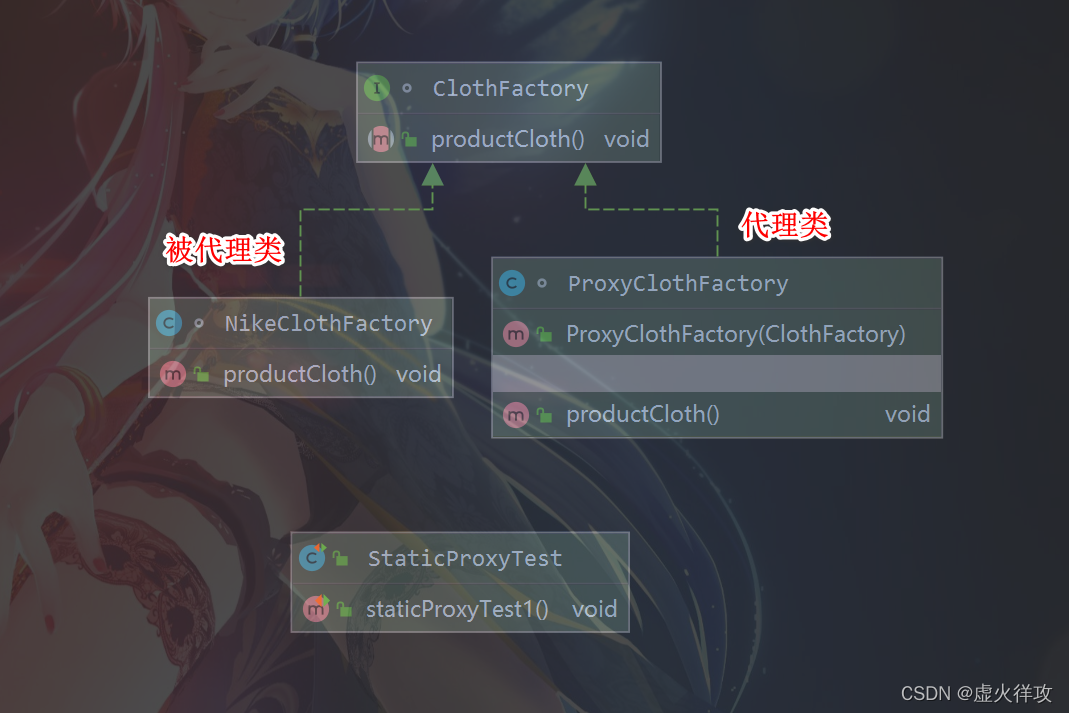代理模式
使用一个代理将对象包装起来, 然后用该代理对象取代原始对象。任何对原始对象的调用都要通过代理。代理对象决定是否以及何时将方法调用转到原始对象上。
静态代理
静态代理特征是代理类和目标对象的类都是在编译期间确定下来,不利于程序的扩展。同时,每一个代理类只能为一个接口服务,这样一来程序开发中必然产生过多的代理。最好可以通过一个代理类完成全部的代理功能。

静态代理举例
//静态代理举例,代理类和被代理类在编译期间就确定下来了.
public class StaticProxyTest {
@Test
public void staticProxyTest1(){
NikeClothFactory nikeClothFactory = new NikeClothFactory();
ProxyClothFactory proxyClothFactory = new ProxyClothFactory(nikeClothFactory);
proxyClothFactory.productCloth();
}
}
interface ClothFactory{
void productCloth();
}
//代理类
class ProxyClothFactory implements ClothFactory{
private ClothFactory clothFactory;
public ProxyClothFactory(ClothFactory clothFactory) {
this.clothFactory = clothFactory;
}
@Override
public void productCloth() {
System.out.println("代理工厂做了一些准备工作");
clothFactory.productCloth();
System.out.println("代理工厂做了一些收尾工作");
}
}
//被代理类
class NikeClothFactory implements ClothFactory{
@Override
public void productCloth() {
System.out.println("Nike工厂生产了一批运动服");
}
}
动态代理
动态代理是指客户通过代理类来调用其它对象的方法,并且是在程序运行时根据需要动态创建目标类的代理对象。
动态代理使用场:
- 调试
- 远程方法调用
动态代理相比于静态代理的优点:
抽象角色中(接口)声明的所有方法都被转移到调用处理器一个集中的方法中处理,这样,我们可以更加灵活和统一的处理众多的方法。

动态代理举例
//动态代理举例
public class ProxyTest {
@Test
public void ProxyTest() {
SuperMan superMan = new SuperMan();
//proxyInstance 代理类对象
Human proxyInstance = (Human) ProxyFactory.getProxyInstance(superMan);
System.out.println(proxyInstance.getBelief());
proxyInstance.eat("四川火锅~");
}
}
interface Human {
String getBelief();
void eat(String food);
}
//被代理类
class SuperMan implements Human {
@Override
public String getBelief() {
return "I believe I can fly!";
}
@Override
public void eat(String food) {
System.out.println("我喜欢吃" + food);
}
}
/*
要想实现动态代理需要解决的问题
问题一: 如果根据加载到内存中的被代理类,动态地创建一个代理类极其对象
问题二: 当通过代理类的对象调用方法时,如何动态的去调用被代理类中的同名方法
*/
class ProxyFactory {
//调用此方法,返回一个代理类的对象.解决问题一
public static Object getProxyInstance(Object obj) {//obj 被代理的对象
MyInvocationHandler myInvocationHandler = new MyInvocationHandler();
myInvocationHandler.bind(obj);
return Proxy.newProxyInstance(obj.getClass().getClassLoader(), obj.getClass().getInterfaces(), myInvocationHandler);
}
}
class MyInvocationHandler implements InvocationHandler {
private Object obj;//需要使用被代理类的对象进行赋值
public void bind(Object obj) {
this.obj = obj;
}
//当我们通过代理类的对象,调用方法a时,就会自动的调用如下的方法: invoke()
//将被代理类要执行的方法a的功能就声明在invoke()中
@Override
public Object invoke(Object proxy, Method method, Object[] args) throws Throwable {
//method: 即为代理类对象调用的方法,此方法也就作为了被代理类对象要调用的方法
//obj: 被代理类的对象
System.out.println("代理类 做一些准备工作");//代理方法a()
Object o = method.invoke(obj, args);
System.out.println("代理类 做一些收尾工作");
//上述方法的返回值就作为当前类中的invoke()返回值
return o;
}
}